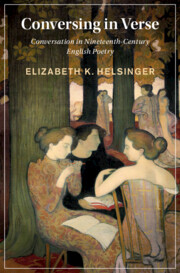Book contents
- Conversing in Verse
- Cambridge Studies in Nineteenth-Century Literature and Culture
- Conversing in Verse
- Copyright page
- Contents
- Figures
- Acknowledgments
- Chapter 1 Introduction: A Poetics of Encounter
- Chapter 2 Dialogue and the Idyll: Tennyson and Landor
- Chapter 3 Performing Conversation: Swinburne and Robert Browning
- Chapter 4 Projects of Animation: Coleridge and Clare
- Chapter 5 Ecphrastic Questions: Dante Gabriel Rossetti and Michael Field
- Chapter 6 Cruel Intimacies: Christina Rossetti and Thomas Hardy
- Epilogue
- Notes
- Bibliography
- Index
- Cambridge Studies in Nineteenth-Century Literature and Culture
Chapter 6 - Cruel Intimacies: Christina Rossetti and Thomas Hardy
Published online by Cambridge University Press: 21 July 2022
- Conversing in Verse
- Cambridge Studies in Nineteenth-Century Literature and Culture
- Conversing in Verse
- Copyright page
- Contents
- Figures
- Acknowledgments
- Chapter 1 Introduction: A Poetics of Encounter
- Chapter 2 Dialogue and the Idyll: Tennyson and Landor
- Chapter 3 Performing Conversation: Swinburne and Robert Browning
- Chapter 4 Projects of Animation: Coleridge and Clare
- Chapter 5 Ecphrastic Questions: Dante Gabriel Rossetti and Michael Field
- Chapter 6 Cruel Intimacies: Christina Rossetti and Thomas Hardy
- Epilogue
- Notes
- Bibliography
- Index
- Cambridge Studies in Nineteenth-Century Literature and Culture
Summary
Chapter 6 begins with ballad talk (the ballad convention of narration through conversation) as it was adopted by eighteenth- and nineteenth-century English poets in verses both popular and literary in response to revived interest in the print mediation of traditional Anglo-Scottish ballads. The chapter pays particular attention to Christina Rossetti’s and Hardy’s ironic reworkings of ballad conventions. Their reliance on the expectations aroused by traditional ballads, the chapter argues, especially in the much harder cases of imagining intimate conversational relations with the silent dead or with God, prepares the depictions of failed intimacy in Hardy’s elegies for his wife Emma and in Rossetti’s devotional colloquies and roundels. There talking with ghosts or with God becomes all too often a disappointed hope of resuming conversations that failed in life (Hardy) or painfully anticipating a silent harmony with God and the saints in paradise through the imperfect approximations of poetry (Rossetti).
- Type
- Chapter
- Information
- Conversing in VerseConversation in Nineteenth-Century English Poetry, pp. 136 - 154Publisher: Cambridge University PressPrint publication year: 2022

